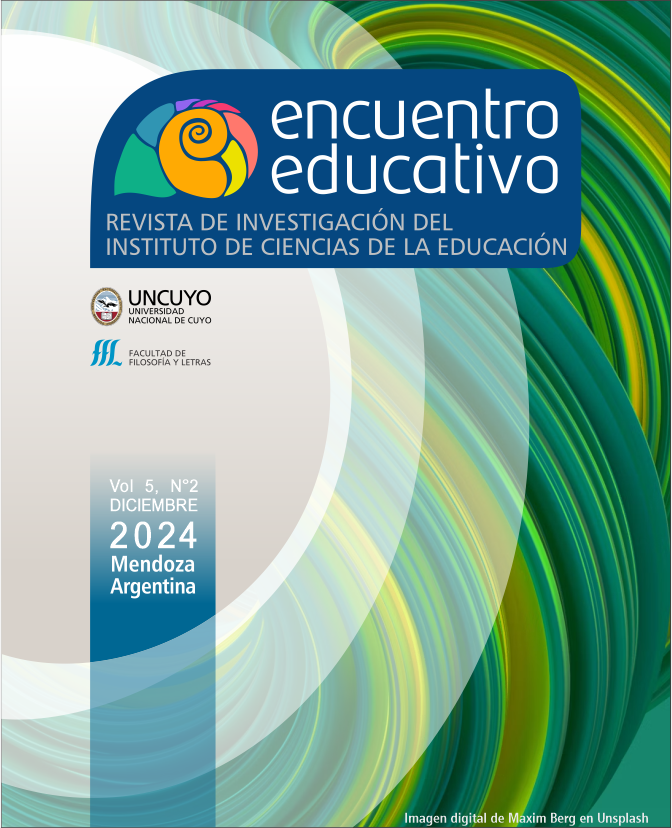The Fundación Cimientos Accompanying Schools Program
Experience in the Province of Mendoza
Keywords:
teacher education, school trajectories accompaniment, secondary level, institutional project, socio-emotional skillsAbstract
In this article we explain what the Fundación Cimientos Accompanying Schools Program consists of, focusing on its design, its conceptual pillars, its methodology and the different pedagogical strategies that are carried out for its implementation and putting into practice. Likewise, we present some results that arise from the implementation of the year 2023 in the province of Mendoza and that focus on the Final Integrative Project (TIF) prepared by the secondary school teachers who participate in the Program. In this TIF, the participants in the teaching path design a project to support school trajectories in an institutional manner, whose core consists of putting together 4 support devices based on the problems identified at school and focusing on socio-emotional skills. In this article we present some general data that arises from the evaluation of the Mendoza 2023 TIF, carried out by the Program team. In addition, we analyzed a selection of four TIFs, where we observed, in more specific terms, how the Program participants addressed their slogan. At last, in the final reflections of the article, we return to the most relevant points of the Program and put them in dialogue with the constructions of the participants.
References
Arias Ortiz, E., Hincapié, D., Paredes, D. (2020). Educar para la vida: El desarrollo de las habilidades socioemocionales y el rol de los docentes. Banco Interamericano de Desarrollo.
Cimientos – Ministerio de Educación de la Nación (2019). Memorias del Trayecto de Formación “Secundaria 2030: Acompañamiento a las Trayectorias Escolares”. Ministerio de Educación de la Nación.
Dirié, C. (Coord.) (2015). Las tutorías en la educación secundaria en el marco del Plan de Mejora Institucional: estudio en tres jurisdicciones. Ministerio de Educación de la Nación.
Duckworth, A. L., Peterson, C., Mathews, M., y Kelly, D. (2007). Grit: Perseverance and Passion for Long-Term Goals. Journal of Personality and Social Psychology, 92(6), 1087-1101
Durlak, J. A., Weissberg, R. P., Dymnicki, A. B., Taylor, R. D., & Schellinger, K. B. (2011). Enhancing students’ social and emotional development promotes success in school: Results of a meta-analysis. Child Development, 82, 405-432.
Heckman, J. J. & Kautz, T.D. (2014). Hard evidence on soft skills. Labour Economics, 19(4), 451-464.
OCDE (2021). América Latina tras el COVID-19: cómo impulsar una recuperación tan deseada. Departamento de Economía. OCDE.
Perrenoud, P. (2003). Desarrollar la práctica reflexiva en el oficio de enseñar. Graó.
Satulovsky, S. y Theuler, S. (2009). Tutorías: un modelo para armar y desarmar. La tutoría en los primeros años de la escuela secundaria. Noveduc.
Segovia Largo, A., Fresco Calvo, X. (2000). La acción tutorial en el marco docente. Seminario Gallego de Educación para la Paz.
Taylor, R. D., Durlak, J. A., Weissberg, R. P & Oberle, E. (2017). Promoting Positive Youth Development Through School-Based Social and Emotional Learning Interventions: A Meta-Analysis of Follow-Up Effects. Child Development, 88, 1156-1171.
Viel, P. (2009). Gestión de la Tutoría Escolar. Noveduc.
Downloads
Published
How to Cite
Issue
Section
License
Copyright (c) 2024 Agustina Desalvo, Daniela Valencia

This work is licensed under a Creative Commons Attribution-NonCommercial 4.0 International License.


















